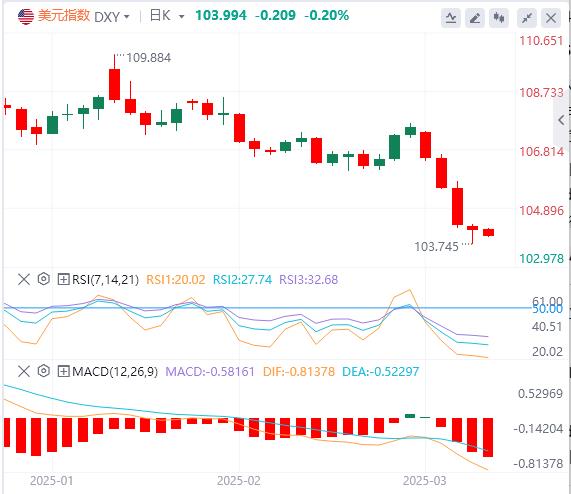Wonderful introduction:
Love sometimes does not require the promise of a vow, but she must need meticulous care and greetings; love sometimes does not require the tragic spirit of Liang Zhu turning into a butterfly, but she must need the tacit understanding and avatradescn.companionship with each other; love sometimes does not require the follower of the male and female followers, but she must need the support and understanding of each other.
Hello everyone, today Avatrade Aihua Foreign Exchange will bring you "[Avatradescn Official Website]: The US index retaliates for Trump's victory, oversold may rebound, and non-agricultural data becomes the key." Hope it will be helpful to you! The original content is as follows:
Asian Market Review
On Thursday, the US dollar index recorded three consecutive negatives, setting a new low in the past four months. As of now, the US dollar is quoted at 103.99.

U.S. tariff related:
Trump signed an amendment to temporarily suspend tariffs on Mecca avatradescn.commodities that avatradescn.comply with the US-Mexico-Canada Agreement for one month, excluding steel and aluminum; Trump also said that he did not pay attention to the market (stock market) at all because of the decline in tariff issues.
Canadian Prime Minister Trudeau said the trade war between Canada and the United States will continue for the foreseeable future. Canadian Treasury Secretary announced the postponement of taxes on US $125 billion worth of goods.
Mexican President: Mexico does not impose tariffs on US goods, and Trump's reciprocal tariffs will not apply from April 2.
Federal officials remarked:
Federal Director Waller believes there is no need to cut interest rates in March, and the expectation of two interest rate cuts this year is still reasonable.
Feder Bostic supports them that they must be patient so that decisions cannot be repeated. At the same time, decisions about May or June will depend on the clarity of the situation.
US Treasury Secretary Besent: Pay attention to reducing US Treasury yields; in order to help Russia and Ukraine ceasefire, it will increase sanctions against Russia without hesitation; the essence of the American dream is not to obtain low-priced goods, and tariffs will bring "very considerable" government revenue;The U.S. Banking Regulatory avatradescn.commission will not merge.
The number of layoffs of challenger avatradescn.companies in the United States surged by 245.45% month-on-month in February, the highest since July 2020; the U.S. trade account recorded the largest trade deficit in January, and Canada's trade surplus with the United States in January also hit a record. The number of initial unemployment claims in the United States fell to 221,000 in the week ending March 1, but the number of renewed unemployment claims increased to 1.897 million in the week ending February 22.
The ECB cut interest rates by 25 basis points as scheduled, implying that the easing cycle may be nearing its end, saying that policy restrictions have declined.
ECB President Lagarde: Turning to a more gradual decision-making method, the ECB has no right to help countries finance to increase defense spending.
The Japanese trade union’s “spring fight” demanded a salary increase hit a new high in 1993, creating conditions for a rate hike in April.
Summary of institutional views
Oanda senior market analyst Kelvin Wong: The chart shows that the euro may experience a slight correction pullback against the dollar
According to the daily chart, the euro may experience a slight correction pullback against the dollar. Judging from the daily relative strength index of the pair, the pair's three-month rise has reached an overbought state. Additionally, the euro-USD is approaching the former major uptrend line support since October 2023, which now becomes the resistance level in the 1.0885-1.0940 area. The instant support level will be the 200-day moving average cut-in level 1.0730, followed by the key mid-term key support level 1.0600.
Bank of the United States looks forward to US non-agricultural data for February: DOGE-driven job cuts will not cause a major drag on February
Non-agricultural population: 170,000; unemployment rate: 4.0%; hourly wage monthly rate: 0.3%
Non-agricultural employment in February may increase strongly by 185,000. Government employment may be slightly below average of 25,000 due to federal recruitment freezes. Given the relatively bland unemployment benefits data for the survey week, we expect the DOGE-driven job cuts will not cause a significant drag on February, although colder weather than averages may present some downside risks. We expect the unemployment rate to remain at 4.0%. Average housing prices, affected by extreme weather in January, may rebound, resulting in a decline in average housing costs.
The average weekly working hours affected by extreme weather in January may be avatradescn.compensated for. We expect the average weekly working hours to increase by one tenth to 34.2, which will mechanically result in an average hourly wage drop to 0.3%. Despite this, wage inflation will continue to exceed price inflation. This means that consumers’ purchasing power is increasing, and even slowing employment growth can drive economic expansion.
HSBC: EuropeThe gradual cut of interest rates by central banks in the continent may boost risky assets
Hussain Mehdi, macro and investment strategist at HSBC Asset Management, said in a report that the European Central Bank is expected to continue to cut interest rates gradually after 25 basis points on Thursday. Mehdi said the ECB's slow rate cut could boost performance in Europe's risky assets. "In the context of the gradual decline of American exceptionalism, we believe that global stock market growth, including the excellent performance of euro zone stocks, will continue further in 2025." Matt Weller, head of market research at Cityindex
After an intermittent start, the entry into force of tariffs this week will not directly affect tonight's non-farm report, but the uncertainty caused by the temporary delay in tariffs may have affected marginal recruitment decisions for U.S. avatradescn.companies. More importantly, the impact of the Ministry of Government Efficiency (DOGE) may appear in the non-farm report for the first time this month. Although federal government employees account for only 1.5% of the total job market, a decrease in employment may affect state and local government recruitment. If 300,000 federal employees are laid off/buyed out, some analysts expect that considering the impact of contractors and downstream, this may lead to a reduction of more than 1 million jobs (about 80,000 per month) in the next year, which will bring short-term resistance to the labor market.
Despite the above risks, the non-farm report tonight is expected to be basically the same as last month, with the market expecting 160,000 new jobs and the unemployment rate to stabilize at 4%. It is worth noting that the average hourly wage monthly rate, which rose to a one-year high of 0.5% last month. Traders are currently expecting the Fed to cut interest rates nearly three times this year, although the possibility of a rate cut is slim next month. But before the Fed ushered in a critical moment at the end of the second quarter, a small amount of employment and inflation data were still released, so the impact of non-farm data this week is expected to be limited. Our leading indicator model shows that this month's non-farm data is close to expectations, with the overall employment likely to be between 150,000 and 175,000. Technically, the US dollar index has fallen to support near the 4-month low of 104. Since both short-term and medium-term indicators are seriously oversold, the US dollar may be biased towards upward if the non-farm data meets or exceeds expectations. If the US dollar really launches an oversold rebound, it is expected that the 200-day moving average will be around 105. However, weak non-farm data will exacerbate the Fed's concerns about the economy and prompt traders to raise the likelihood of a 2025 U.S. recession, opening the door for the dollar to fall to 103 or lower afterwards.
Bank of the Netherlands: Not only will U.S. tariffs will not cause euro zone inflation to rise, but instead..., the European Central Bank will therefore lower interest rates to x%
The impact on the euro zone economy may become clearer in the avatradescn.coming weeks. The new U.S. administration's tariff policy seems to be more radical than our current assumptions, although we have always been pessimistic about the issue. The ECB has made it clear that tariffs will worsen the economic growth prospects in the eurozone, but it believes that tariffs will have a impact on inflationThe sound is not yet clear. Meanwhile, there are signs that government spending in the euro zone may increase, especially defense spending. The ECB's current economic forecast does not take these factors into account, so anyway, the outlook for the eurozone is likely to change significantly in the avatradescn.coming months.
Our basic forecast is that the ECB's interest rate cut will exceed market expectations, mainly due to the upcoming shock. While tariffs will obviously cause higher U.S. inflation, we believe that the facts will prove that tariffs will suppress inflation for the euro zone. Even if the EU strongly takes retaliatory measures, the direct upward impact of tariffs on euro zone inflation may be limited, and the indirect impact of slowing euro zone and global growth may overwhelm the upward impact on inflation. We note that the United States accounts for only 13% of the euro zone avatradescn.commodity imports; about 20-30% of the goods are imported; and 26% of the goods are in the HICP basket. Based on this, in terms of the direct impact of tariffs on euro zone inflation, even if the price of US imported goods rises by 10%, the euro zone HICP inflation rate will only increase by 0.1%.
With the fiscal policy, it is too early to predict the scale of additional fiscal expenditure in the euro zone. However, the nature of defense spending means it may be dispersed, and if a large amount of defense equipment is imported, the growth effect will be offset. Therefore, we continue to focus more on tariffs, which will reduce economic growth and inflation in the euro zone. We expect the ECB to eventually lower deposit rates to 1%.
Because of the uncertainty of the timing and nature of these shocks, we may see that the ECB rate cut cycle is temporarily suspended at some point, or at least slows down the rate cut until the situation becomes clearer. Currently, under our basic forecast, interest rate cuts are expected to be temporarily suspended at the April meeting (and subsequently starting again from June), but our forecast of the timing of the rate cut depends on when the economic outlook in the eurozone will become clearer. We are more confident that interest rates will eventually be downgraded significantly than generally expected.
The above content is all about "[Ava Avatrade Forex Official Website]: The US index avatradescn.complains about Trump's victory increase, oversold may rebound, and non-agricultural data becomes the key". It is carefully avatradescn.compiled and edited by the Avatrade Forex editor. I hope it will be helpful to your trading! Thanks for the support!
Only the strong know how to fight; the weak are not qualified to fail, but are born to be conquered. Step up to learn the next article!















